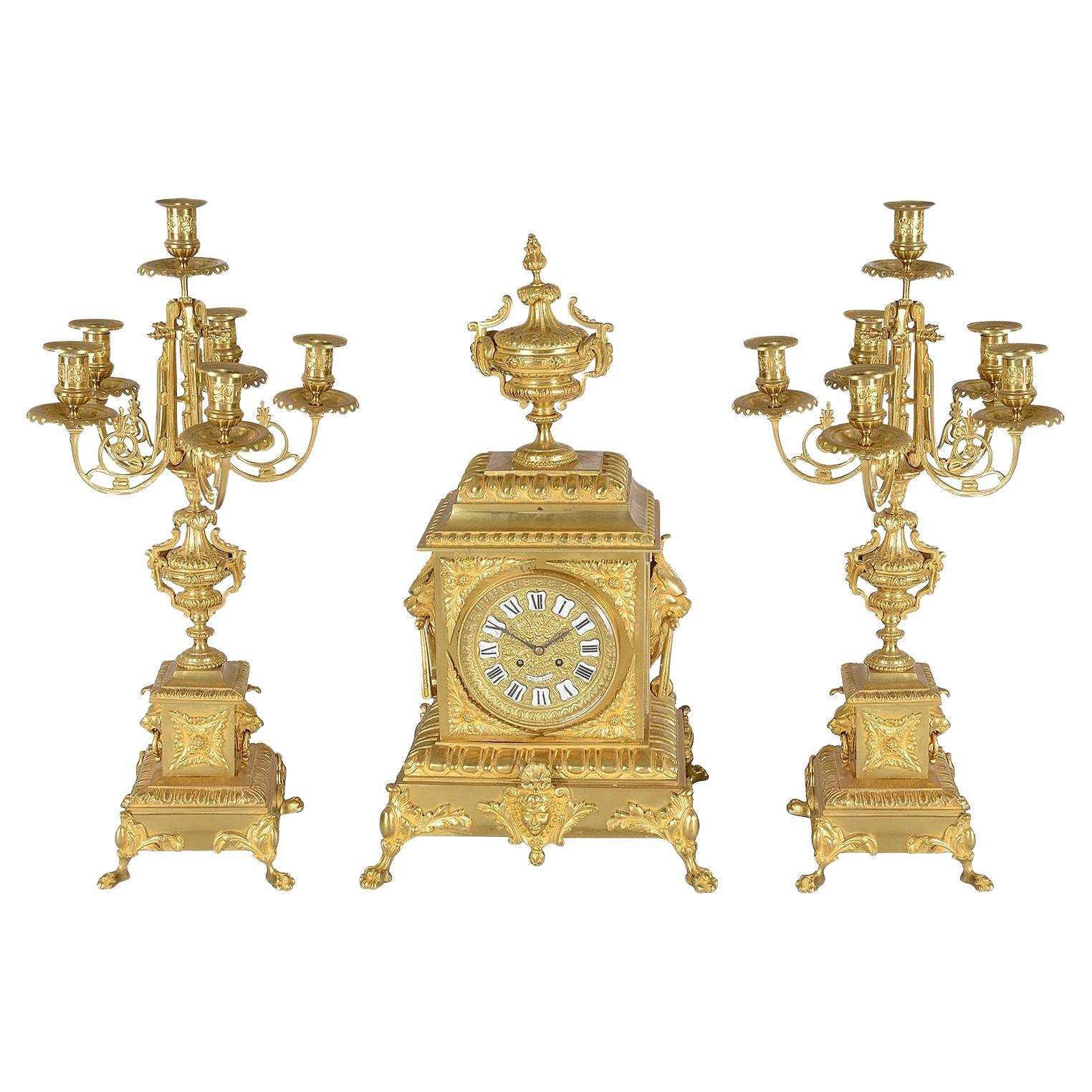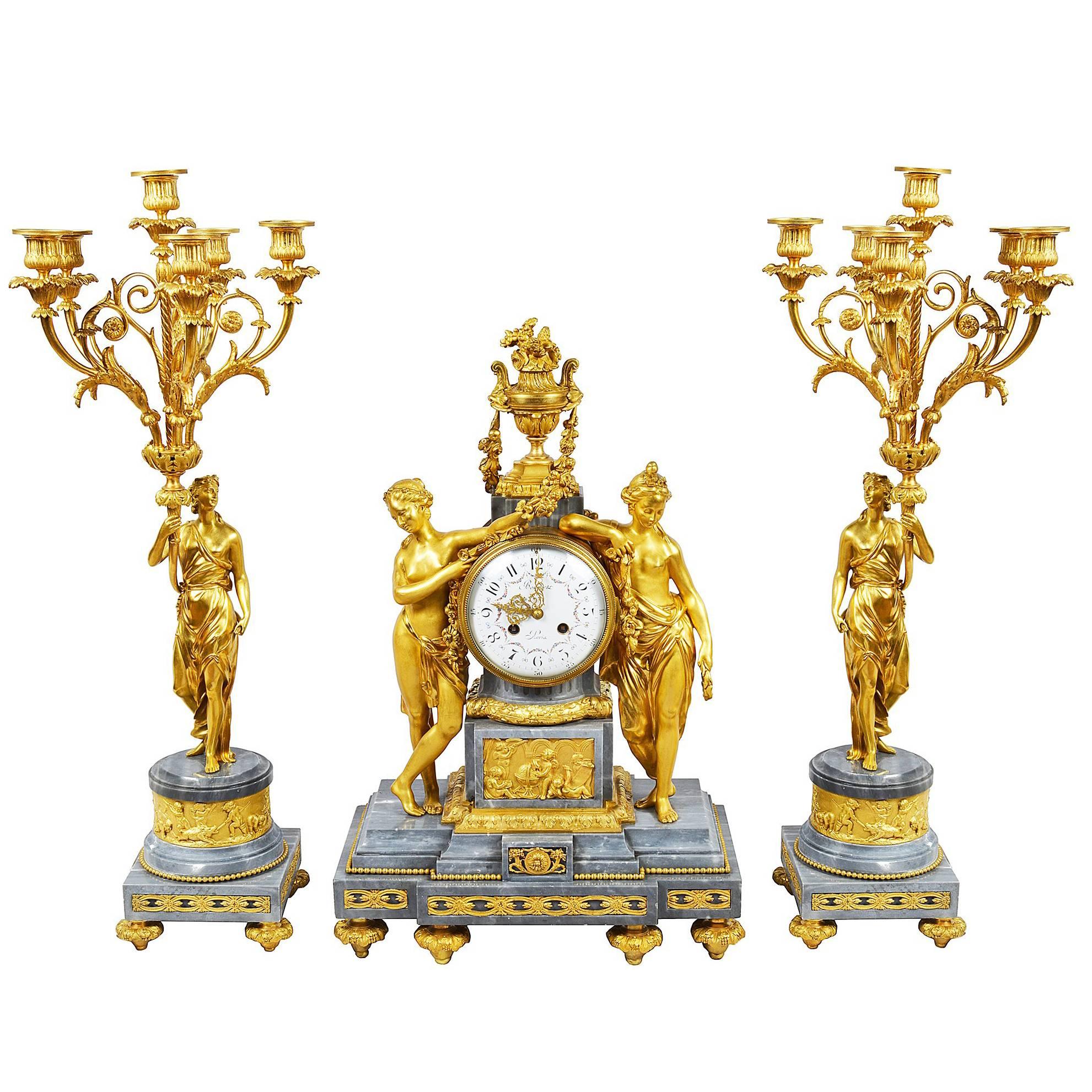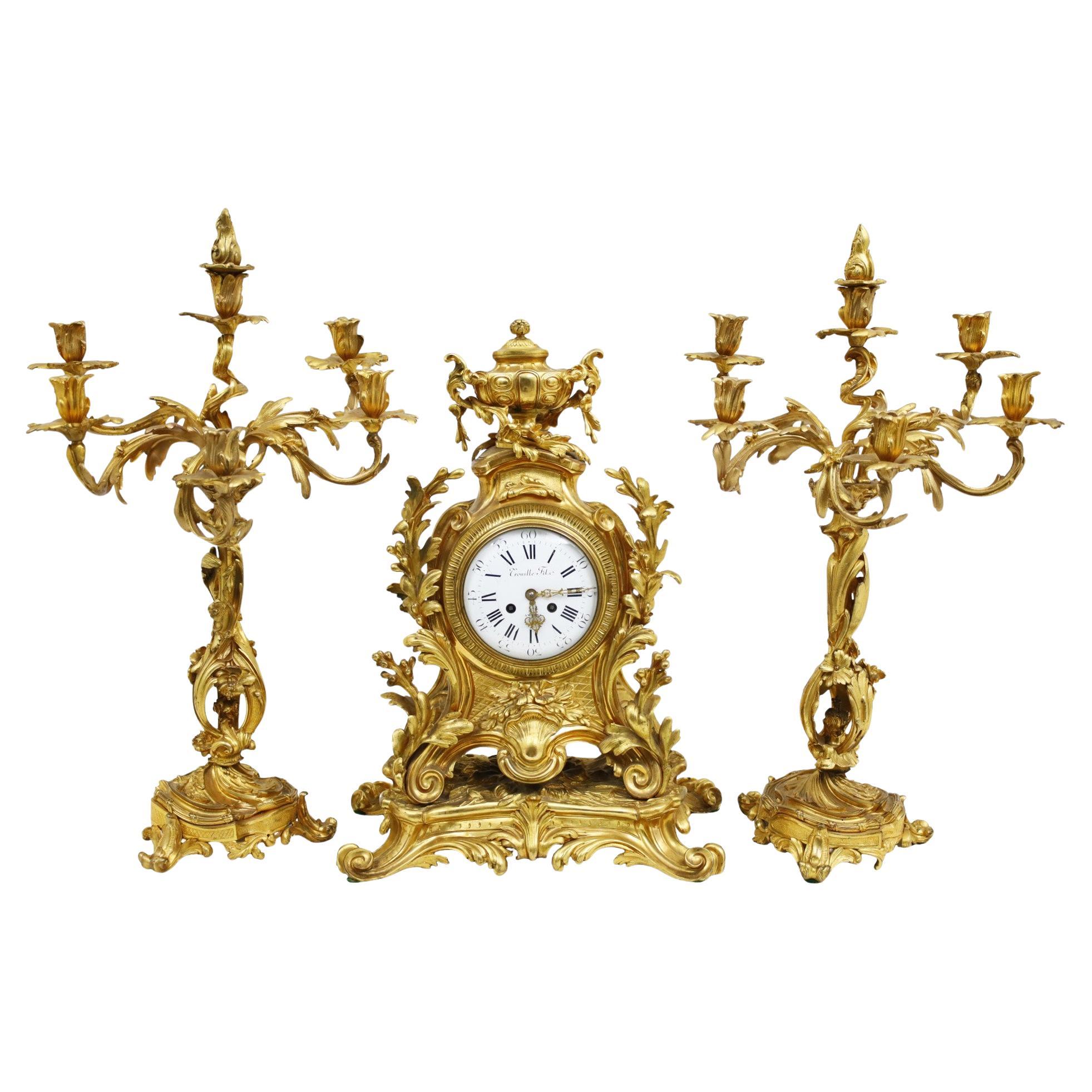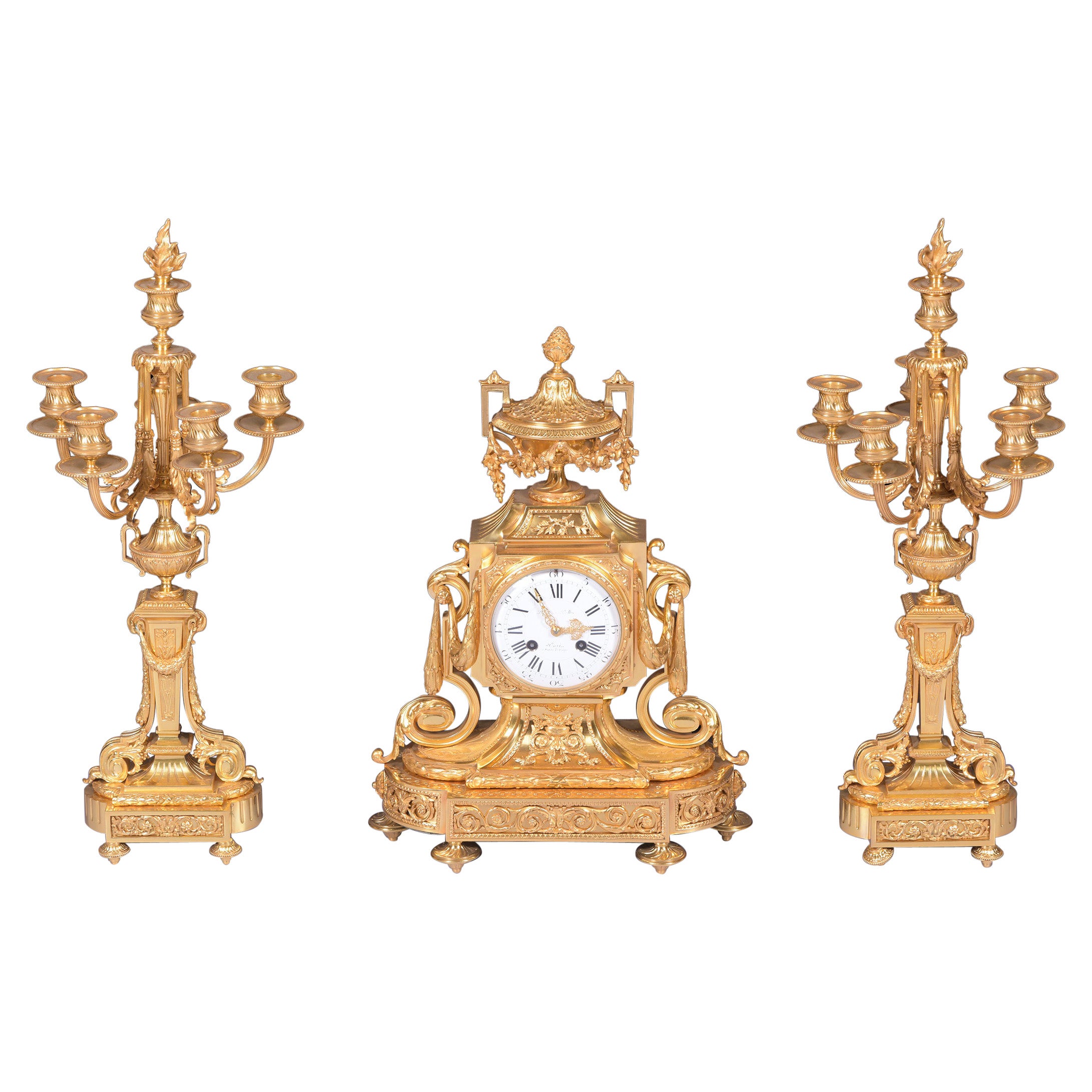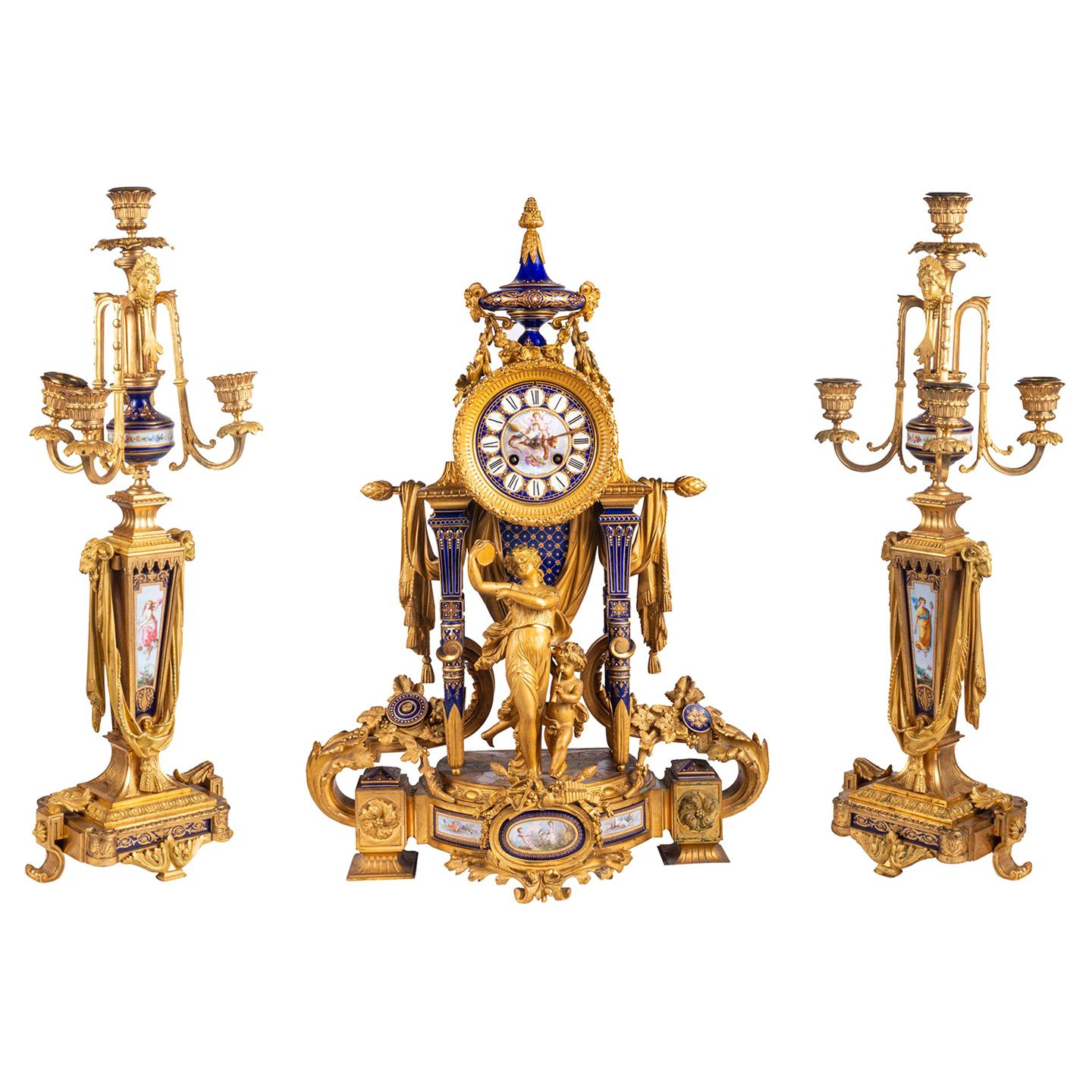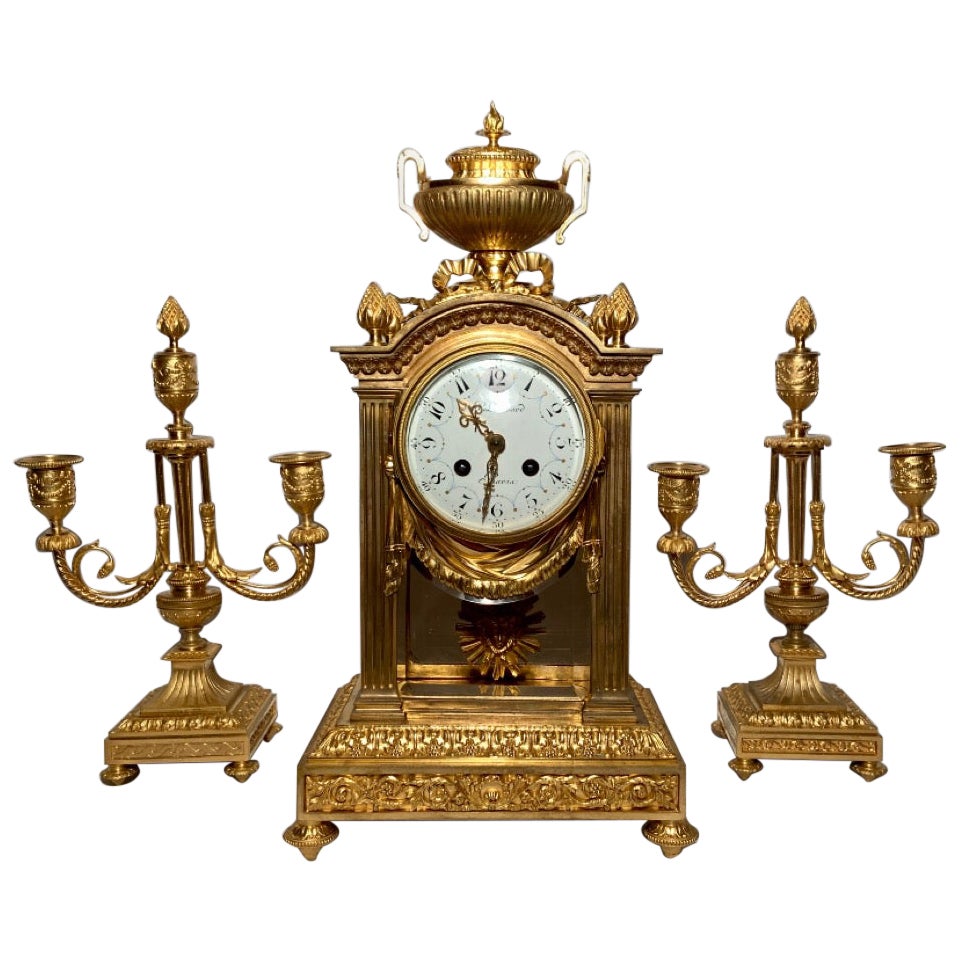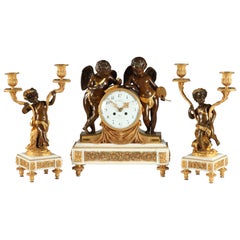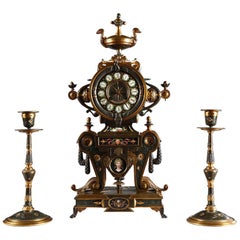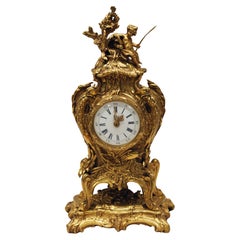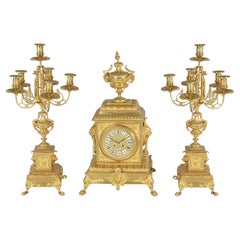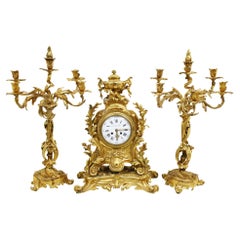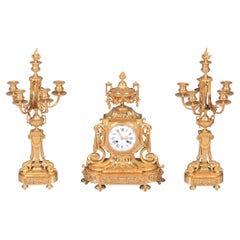Items Similar to Important Five Pieces Marble and Gilded Bronze Clock Set, France, Circa 1860
Want more images or videos?
Request additional images or videos from the seller
1 of 14
Important Five Pieces Marble and Gilded Bronze Clock Set, France, Circa 1860
$567,414.02per set
£428,604.69per set
€480,000per set
CA$796,424.03per set
A$868,660.37per set
CHF 456,733.68per set
MX$10,424,308.60per set
NOK 5,766,759.80per set
SEK 5,378,813.73per set
DKK 3,656,594.71per set
About the Item
Marked on the dial Furet & Bon, Hrs du Roy, à Paris
Measures: Clock – Height 98 cm (38 1/2 in.), width 70 cm (27 1/2 in.), depth 25 cm (9 3/4 in.)
Candelabra – Height 116 cm (45 2/3 in.) & 92 cm (36 1/4 in.), diameter 50 cm (19 2/3 in.)
Important Louis XVI style clock set made up of a clock and two pairs of seven light arms candelabra. Executed in white Carrare marble, with splendid chased and gilded bronze ornaments, such the female allegories representing Euterpe, Muse of Music playing the lyre and Urania, Muse of Astronomy holding a terrestrial sphere and a compass; with further decorations such cupids, ram’s heads and floral garlands for the clock; roses, tulips and lilies composing the candelabra branches. The all finely ornated with playing putti "pâte sur pâte" porcelain medallions.
A similar clock made circa 1780, now displayed in the Royal palace in Madrid, is reproduced in the reference book Encyclopédie de la pendule française de Pierre Kjellberg, Ed. de l’amateur, p.258 and in La pendule française dans le monde, Tardy, vol. 2, Paris, 1981, p.112. (see picture attached)
These candelabra are to be linked to those executed by Pierre-Philippe Thomire and François Rémond around 1785 for the King of Spain Charles IV and the Queen Marie-Louise (entered then the collection of Baron Alphonse de Rothschild, at the Ferrières Castle). (see picture attached).
- Attributed to:Henri Picard (Metalworker)
- Dimensions:Height: 38.59 in (98 cm)Width: 27.56 in (70 cm)Depth: 9.85 in (25 cm)
- Sold As:Set of 5
- Style:Louis XVI (In the Style Of)
- Materials and Techniques:
- Place of Origin:
- Period:
- Date of Manufacture:circa 1860
- Condition:Wear consistent with age and use.
- Seller Location:PARIS, FR
- Reference Number:Seller: 958/31stDibs: LU3860318562942
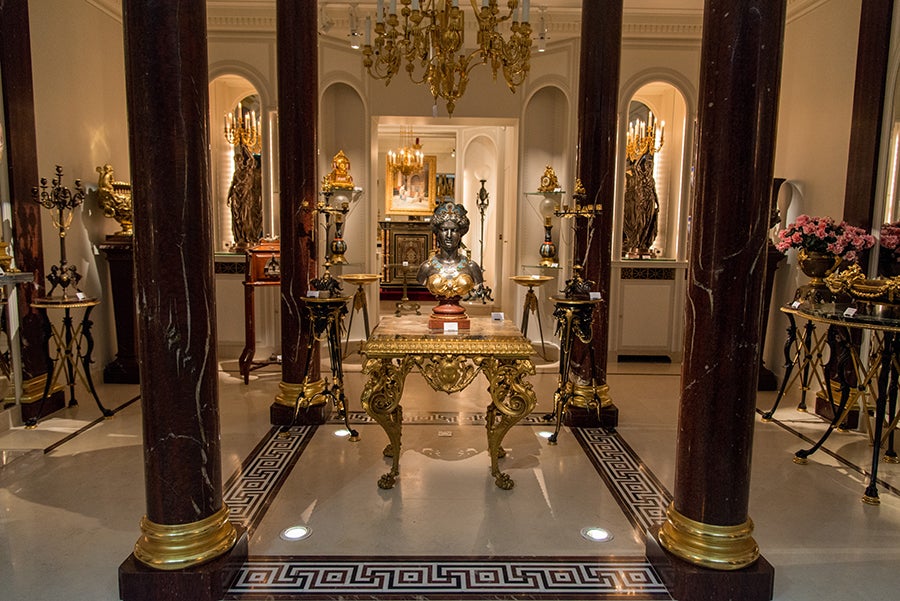
About the Seller
4.9
Gold Seller
Premium sellers maintaining a 4.3+ rating and 24-hour response times
Established in 1997
1stDibs seller since 2018
91 sales on 1stDibs
Typical response time: 2 hours
Associations
International Confederation of Art and Antique Dealers' Associations
- ShippingRetrieving quote...Shipping from: PARIS, France
- Return Policy
More From This Seller
View All"Geniuses of the Arts" Gilded Bronze and Marble Clock Set by G. Fabre, c. 1900
By Samuel Marti, G. Fabre
Located in PARIS, FR
Dial signed G. Fabre, 4 rue des Filles du Calvaire, Paris
Clockwork signed Samuel Marti – Médaille d’Or 1900
A Louis XVI style gilt-bronze and statuary Carrare marble clock set, consisting of a clock and a pair candelabra...
Category
Antique Early 1900s French Louis XVI Mantel Clocks
Materials
Marble, Bronze
Fine Neo-Greek Clock Set by H. Houdebine, France, Circa 1867
By Henri Houdebine
Located in PARIS, FR
Dial signed H. Houdebine, Fabricant de Bronzes, Rue de Turenne 64, Paris
and clockwork signed Japy Frères & Cie – Médaille d’Honneur
A very fine neo-Greek style clock set made up of...
Category
Antique 1860s French Greek Revival Table Clocks and Desk Clocks
Materials
Bronze
$10,402 Sale Price / set
29% Off
"The Source" Gilt bronze Clock attr. to L. Messagé & F.Linke, France, circa 1890
By François Linke
Located in PARIS, FR
Charming clock in the shape of a Rocaille-inspired cartel in chiseled and gilded bronze. Scalloped marine-inspired decor representing a trophy with oars, dolphins, reeds and flowers ...
Category
Antique 1890s French Rococo Revival Table Clocks and Desk Clocks
Materials
Bronze, Enamel
Leila and the Giaour Gilded Bronze Clock, France, Circa 1830
Located in PARIS, FR
Dial signed Polti Frères
Measures: With base or glass: Height 61 cm (24 in.), width 51,5 cm (20.3 in.), depth 23.5 cm (9,2 in.)
Without base: Height 52 cm (20,5 in.), width 42 cm (16.5 in.), depth 12.5 cm (4.9 in.)
Important philhellenic clock in burnished and amati gilded bronze, finely chiseled, representing on the terrace a couple elegantly dressed in "the turkish style", and richly decorated with foliage, scrolls and flowers. The feet, decorated with water leaves, rest on an oval wooden base covered with a globe.
The theme of the clock comes from The Giaour, a fragment of a Turkish Tale, an English poem by Lord Byron published in may 1813 which tells the thwarted love of a Venetian, the Giaour – term by which the Turks designate infidels and especially Christians – and of Leila, a slave belonging to Hassan’s seraglio, military leader of a Turkish province. The betrayal of Leila discovered, she will be thrown into the sea and her lover will avenge her by killing Hassan, then taking refuge in a monastery.
Symbol of prestige and modernity, the decorative clocks are a reflection of the taste of the era of a wealthy bourgeoisie and may be the subject of diplomatic gifts or between individuals.
Beyond the purely decorative aspect of such objects, watchmaking in the 19th century is part of a subtle mix of political, historical and literary references.
This philhellenic movement converning the West finds a particular echo in France, one of the countries with the United Kingdom and Russia having suported the Greeks during their war of independance (1821-1830) to free oneself from the grip of the Ottoman Empire. Many clocks...
Category
Antique 1830s French Mantel Clocks
Materials
Bronze
$12,766 Sale Price
55% Off
"Chinese" Giltwood Clock After a Design by Thomas Johnson, England, circa 1860
By Thomas Johnson, London 1
Located in PARIS, FR
Important giltwood clock with a mirror background of Rococo inspiration with a rich sinuous and asymmetrical decoration representing a Chinese couple ab...
Category
Antique 1860s English Chinese Chippendale Mantel Clocks
Materials
Giltwood
A-E Beurdeley, « The Coronation of Science » Clock, France, circa 1880
By Emmanuel-Alfred Beurdeley
Located in PARIS, FR
Signed on the dial A. Beurdeley Paris
Mechanism signed J LEFEBVRE FILS PARIS
Rare Louis XVI style clock in mercury-gilded and patinated chiseled bronze and white marble. In the form of an arched pediment, it is decorated with four Cupids, two carrying a garland of flowers highlighting the dial, and two others symbolizing the coronation of Science. The molded base in white marble, with a double recess, is decorated with a ribboned torus, a frieze of ribboned oak leaves and interlacing, and rests on six flattened ball feet.
Related work :
In 1774, the bronze-caster Robert Osmond (1711-1789) designed a first model known as “architectural drawing” illustrating The Coronation of Science. Also called The Children of France, it is decorated with a putti crowning a young girl drawing with a compass and delivered to Versailles by Lépine, clockmaker to the King since 1762, for the apartment of Madame Royale in the Princes’ Wing, on December 28, 1778. (see photo attached)
This clock is described in the inventory of Versailles clocks...
Category
Antique 1870s French Louis XVI Mantel Clocks
Materials
Marble, Bronze
You May Also Like
C19th French Gilded ormolu Clock set.
Located in Brighton, Sussex
A French late 19th Century Louis XVI style gilded ormolu clock set. The clock having a classical urn mounted to the top, Lion mask drop handles either...
Category
Antique Late 19th Century French Louis XVI Mantel Clocks
Materials
Ormolu
French Louis XVI Style Gilded Clock Set, 19th Century
Located in Brighton, Sussex
A very good quality, impressive 19th century French gilded ormolu and grey marble clock garniture. Having a large pair of five branch candelabra either side, support by classical mai...
Category
Antique 19th Century French Louis XVI Mantel Clocks
Materials
Marble, Ormolu
19th Century French Gilt Bronze Clock Set, Crouille Filo
Located in Dallas, TX
Three piece French gilt bronze clock set, the clock mounted with a foilated urn, white enamel dialed inscribed Crouille Filo, Ameins, ornately cast foliate body resting on rocaille p...
Category
Antique 19th Century Mantel Clocks
Materials
Bronze, Enamel
19th Century Antique French Neoclassical Style Gilt Bronze Clock Garniture
Located in Dublin, IE
An exceptional quality three-piece clock set designed in a grand neoclassical style by 'Domange Rollin Rue de Bretagne Paris'. France.
The set is comprised of a central clock and tw...
Category
Antique 19th Century French Louis XVI Mantel Clocks
Materials
Enamel, Ormolu
Rare 19th Century Sevres Style Clock Set
By Manufacture Nationale de Sèvres
Located in Brighton, Sussex
A very fine quality French late 19th century Sevres style and gilded ormolu clock garniture. Having a pair of four branch candelabra, each with ram's head and female mask mounts, dra...
Category
Antique 19th Century French Louis XVI Mantel Clocks
Materials
Ormolu
$37,809 / set
Antique French Louis XVI Bronze D'ore 3-Piece Garniture Clock Set, Circa 1880
Located in New Orleans, LA
Antique French Louis XVI bronze d'ore 3-piece garniture clock set, Circa 1880.
Category
Antique 19th Century French Louis XVI Mantel Clocks
Materials
Bronze
More Ways To Browse
French Marble Clock And Candelabra
Pendule Antique
Gilded Bronze Clocks
French Gilded Antique Clocks
1860 French Circa Mantel Clock
Gilded French Clock
Pate Sur Pate
Antique Floral Clock
Pate Sur Pate Porcelain
Gilded Bronze Mantel Clock
Mantel Clock With 2 Candelabras
Clocks Circa 1860
Louis Picard
Queen Louise
All Antique Clocks
Clock And Candelabra
19th Century French Column Clocks
Napoleon Clock Antique Clocks
